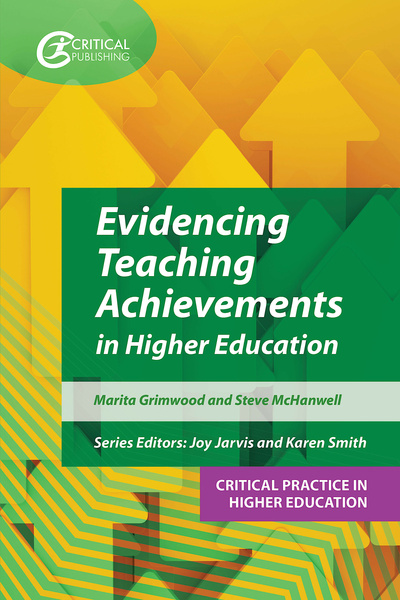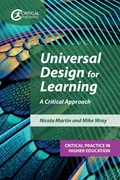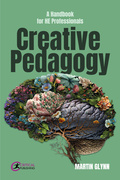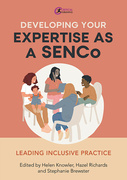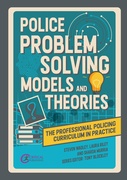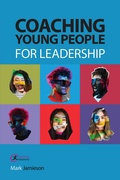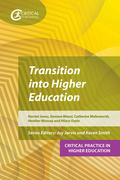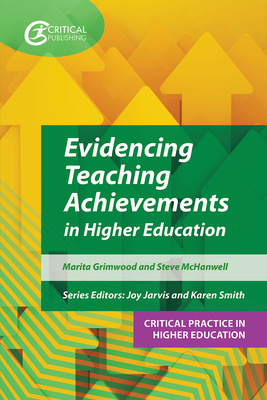
Recommend this title Review this book
Tags: Higher Education, Teaching & Learning
Discounts are available for bulk orders. More details
Evidencing Teaching Achievements in Higher Education
AUTHOR : By Marita Grimwood and Steve McHanwell Edited by Joy Jarvis and Karen Mpamhanga
ISBN : 9781915080622
Edition No : 1
Publication : Sep 16, 2024
Extent : 96 pgs
ISBN : 9781915080639
Edition No : 1
Publication : Sep 16, 2024
Extent : 96 pgs
ISBN : 9781915080646
Edition No : 1
Publication : Sep 16, 2024
Extent : 96 pgs
Description
This book demonstrates how university lecturers can document their impactful teaching and evidence their teaching achievements in the contemporary HE landscape.
It is an essential read for all lecturers who might need to evidence their achievements for academic development including job promotions and Advance HE fellowship. It includes:
- the kinds of evidence that might be sought
- analysis and evaluation of the different forms of evidence available and
- how individuals can develop a narrative of teaching impact.
It also provides institutions with a framework they can use to support staff in collecting and developing qualitative and quantitative evidence for teaching achievements.
Acknowledging the ever-increasing complexity of the teaching role within higher education, the book provides valuable support for individuals wishing to showcase their teaching and institutions looking to recognise and reward academic and professional staff.
Part of the Critical Practice in Higher Education series
Contents
Chapter 1. Introduction: teaching and learning in contemporary Higher Education
Chapter 2. Defining quality in Higher Education teaching
Chapter 3. Evidencing the effectiveness of teaching
Chapter 4. Presenting the evidence
Chapter 5. Supporting and mentoring applicants
Chapter 6. Conclusion
Glossary/List of Acronyms
Bibliography
Index
Author
Marita Grimwood’s career in educational development has spanned academic, professional and freelance roles. She has particular interests in internationalised, inclusive curricula; and in the evidencing, recognition, and reward of learning, teaching and leadership achievements in higher education. Marita has led and contributed to projects institutionally, nationally, and internationally and formerly ran the Staff and Educational Development Association’s (SEDA) Fellowships scheme. She has contributed widely to university staff development as project lead, programme director, lecturer, external examiner, and designer of online and in-person modules. She holds a PhD in English Literature, in which she previously taught and published, Principal Fellowship of the Higher Education Academy, and Fellowship of SEDA. She is currently Senior Adviser in Teaching Fellowships at Advance HE, where she leads on Principal Fellowship.
Steve McHanwell is Emeritus Professor of Anatomical Sciences at Newcastle University and a National Teaching Fellow. He is currently employed part time at the University of Edinburgh. He has had a long-standing interest in parity of esteem and evidencing of teaching, having led two working parties in 2011-2013 and again in 2017-2020 making a series of recommendations leading to significant policy changes in this area in Newcastle. He was co-project lead for Newcastle in the Higher Education Academy Promoting Teaching Project. He has led workshops in this area in Newcastle and is a frequent speaker and workshop leader for other universities.
Joy Jarvis is currently Professor of Educational Practice at the University of Hertfordshire and a UK National Teaching Fellow. She has experience in a wide range of education contexts and works to create effective learning experiences for students and colleagues. She is particularly interested in the professional learning of those engaged in educational practice in higher education settings and has undertaken a range of projects, working with colleagues locally, nationally and internationally, to develop practice in teaching and leadership of teaching. Joy works with doctoral students exploring aspects of educational practice and encourages them to be adventurous in their methodological approaches and to share their findings in a range of contexts to enable practice change.
Karen Mpamhanga (formerly Karen Smith) is Professor of Higher Education and Professional Learning in the School of Education at the University of Hertfordshire. Her research focuses on how higher education policies and practices impact on those who work and study within universities. Karen has worked within educational development and on lecturer development programmes. She holds a Principal Fellowship of the Higher Education Academy and is currently the Director of the University of Hertfordshire’s Professional Doctorate in Education. Karen also leads collaborative research and development in her School, where she engages in externally funded research and evaluation and supports the development of scholarly educational practice through practitioner research.
Publication Overview
Availability:

